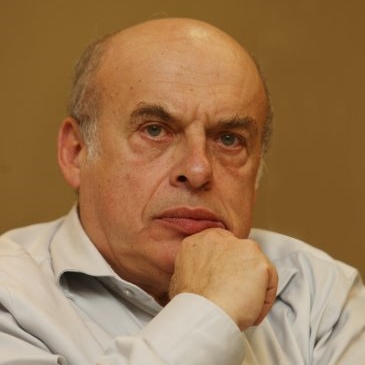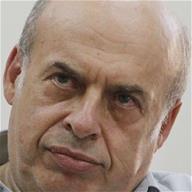
Banner

Sharansky tackling the tough questions
PROF ANTONY ARKIN
What is your focus at the Jewish Agency for Israel today?
As we connect Israel to the Jewish world, historically we focus on aliyah. The numbers of olim are high and are growing. Currently the big operations are in Russia, Ukraine, France and Brazil. People’s reasons differ. In Ukraine there is a war and the collapse in large areas of government infrastructure. In Russia there is increasing concern at the authoritarianism of the government and the concern that the Jewish community is being isolated. In France, the rising anti-Semitism is putting increased pressure on a well-established community. In Brazil the economy seems very close to a meltdown. While we take no credit for these push factors, it is hard work that has ensured Israel is the first choice for those leaving. Ongoing programmes such as birthright, have played important roles in strengthening Jewish identity. We also focus on bringing Israel to the Jewish world. New types of shlichim with new programmes have been introduced. We are now placing shlichim on university campuses. Activism on campuses are the driving force for the deligitimisation of Israel. The students need all the support they deserve. The first shaliach for SAUJS is being put in place. Worldwide there are more than 80 shlichim.
Is the concept of Israel as beacon for the Jewish world still valid?
Historically (Theodor) Herzl’s vision was that World Jewry would move voluntarily to Israel or would assimilate into their host nations. The Diaspora was seen, then, as a passing phase. This is not happening. Millions of Jews continue to live abroad in vibrant, thriving democratic communities. However, there is enormous assimilation in these societies. The only effective bulwarks are Zionism and a strong religious identity. Without these countervailing forces, the existing communities’ grandchildren will not live as Jews. Israel then is essential for Jewish continuity. Much of our work is to strengthen these links with World Jewry. So, while Israeli society is not monolithic and highly opinionated on many issues, including Jewish identity, it plays the central, pivotal role in the life of the Jewish people everywhere.
 Sharansky was previously in SA in March 2015, when ANT KATZ was honoured to spend a jam-packed hour-long, one-on-one with him. This piece went on to be one of JR’s most read stories of the year!
Sharansky was previously in SA in March 2015, when ANT KATZ was honoured to spend a jam-packed hour-long, one-on-one with him. This piece went on to be one of JR’s most read stories of the year!
“I don’t want to be the Commissar of Aliyah”
Read it or print out for a great family Shabbos read.
Knesset members across the political spectrum were terribly disappointed by the lack of support from American Jewry for Israel’s position on the Iran nuclear deal. How serious is this divide?
American Jews voted overwhelmingly for President (Barack) Obama. While I do not agree with every aspect of his administration’s policy towards Israel, it was considered a pivotal issue and Obama genuinely thought he was working in Israel’s best interest. The Iran nuclear deal was very polarising for American Jewry, especially as all major political parties in Israel thought it was fraught with danger. Personally, unlike the fight for the freeing of Russian Jews from the Soviet Union, where strong linkages were made with the regime’s behaviour, Obama made no such linkages with Iran. He should have built far greater safeguards into the process to counter Iranian threats to destroy Israel and to arm Hezbollah, Hamas and other terrorist groups. So it is a great disappointment that the Iranian nuclear deal was not linked to Iran’s destructive actions against Israel. It is hoped that President (Donald) Trump will emphasise far more these linkages going forward.
Having played the lead role in trying to finalise the Kotel prayer plaza and freedom of religion for all streams of Judaism, Prime Minister (Benjamin) Netanyahu has baulked at implementing this despite Cabinet’s approval. How will this impact on Diaspora-Israel relations?
Netanyahu has been most supportive during the three-year negotiations. He brought me in to lead the discussions, but faced criticism. His new government coalition relies on the ultra-Orthodox and charedi parties, who blackmailed him by threatening to bring down the government if the Kotel deal is implemented. The prime minister is asking for more time to find a solution that can be achieved without the collapse of the government. The Supreme Court is likely to be a determining factor and should help to achieve a realistic solution.
Having been one of the most celebrated Jewish Russian human rights activists, what are your thoughts about Russian-Israeli relations today?
There is very little anti-Semitism from the Russian government and the administration has a positive attitude to the Jewish community. There are increasing links to Israel and lot of serious dialogue is taking place. But there are real concerns. The Jewish community was alarmed at the recent expulsion of the senior Chabad rabbi and the increased authoritarianism of Russian society. Russia’s increasing support for the Assad regime in Syria and close ties with Iran, which is trying to build a Shi’ite hegemony on Israel’s northern borders, is a matter of deep concern. There is also a significant leakage of Russian technology and weapons to Hezbollah. Fortunately there is a close dialogue between the Russian and Israeli leadership.
Will US President Donald Trump be good for Israel?
There are good intentions on both sides. However, the Trump administration is not yet fully in place, so there is very little experience and policy developed. Statements that he sees Israel as a main ally are very positive. There are many friendly voices in the administration, but time will tell.




